A Country With Most Peculiar COVID-19 Death Rate (Part I)
This series of articles will discuss the underreported COVID-19 deaths in China and provide an estimate of the total amount of deaths there from 2020–2022. The Chinese regime’s handling of the COVID-19 pandemic has been criticized for its lack of transparency. As the virus spread globally, more questions about China’s COVID-19 data have been raised, yet there still is no clear answer. Again and again, the Chinese Communist Party (CCP) has tried to cover up its lies, but lies can’t stand the test of time, and after three years, the deception has come to light. Internationally renowned demographer Yi Fuxian estimated China’s population in 2020 to be 1.28 billion, significantly lower than the 1.41 billion figure officially reported by the CCP’s census data. This discrepancy in numbers has caught the attention of numerous professionals, organizations, and individuals who have conducted their investigations into the CCP’s data on the current state of the population. The findings of these independent studies have revealed that the official estimates provided by the CCP may be vastly overestimating the actual population numbers. Per Our World in Data, while official figures from China reported a COVID-19 death toll of 5,273 up through Jan. 8, 2023, concerns can be raised about the accuracy of this data. This article examines the available information and investigates any discrepancies or inaccuracies in the official death toll and population figures and the impact of these on the global response to the pandemic. China’s Peculiar COVID-19 Death Rate Since the onset of the pandemic, China’s data has been bizarre, to say the least. For example, according to Our World in Data, by Jan 8, 2023, the United States had a cumulative 1.10 million deaths due to COVID-19, whereas China’s official count was only 5,273. That’s a scale of a 208-fold gap between these two countries. The difference in COVID mortality rates per million people between China and other countries is shocking. According to the Chinese regime, the mortality rate is 3.70 per million people up through Jan. 8. In contrast, Our World in Data shows the U.S. COVID-19 death rate is about 3,239.85 per million. That’s 875.6 times higher. United States versus China mortality rates. (Our World in Data) To give you an idea, if we applied the same mortality rate of the United States to China, the number of deaths in China due to COVID-19 would be 4,568,188 instead of the reported 5,273 by Jan 8, 2023. The United States has a first-class health care system compared to China. So why is there such a significant discrepancy in the mortality data? Is this a matter of overreporting in the United States or underreporting in China, or is there something else going on? Let’s look at other countries besides the United States. Japan and South Korea, being two of Asia’s most affluent and industrialized nations, have significant economic and trade ties with China. Similarly, Singapore, a city-state known for its stringent social policies, maintains a strong relationship with the Chinese market. All three countries have been widely successful in their COVID-19 containment programs, with mortality rates 10 to 20 times lower than in Europe or North America. Surprisingly, China claims to have a COVID-19 mortality rate that is 82–170 times lower than those in Japan, South Korea, and Singapore. Mortality rates in China versus comparable countries. (The Epoch Times) Even more surprisingly, compared to its neighbors, such as Mongolia, Vietnam, Kyrgyzstan, Laos, and India, China claims a mortality rate of 27–170 times lower than these Asian nations. Mortality rates in China versus neighboring countries. (The Epoch Times) If that’s still not enough, let’s compare three countries that strongly contrast China’s officially claimed numbers. One of these countries is Taiwan, known for its highly effective containment efforts. The proximity and genetic similarities between the two nations make this comparison particularly relevant. Yet what was the mortality difference between these countries? According to Our World in Data, Taiwan has a mortality rate of 650 per million people, yet China claims to have a bewildering mortality rate about 175.6 times lower than Taiwan’s. On a similar note, South Korea has an impressively low mortality rate of about 630 deaths per million. The country is quite comparable to China in many respects, yet China’s reported death rate is about 170 times lower than South Korea’s. While it is true that each country’s response to the COVID-19 pandemic has been unique, some countries exercised similar practices. For example, the New Zealand government adopted a “zero-COVID” strategy, similar to the approach taken by China, to control the spread of the virus early on. Given the similarities in their respective policies, one would expect similar mortality rates and overall effectiveness in these countries. Yet was that the case? If we look at China’s m

This series of articles will discuss the underreported COVID-19 deaths in China and provide an estimate of the total amount of deaths there from 2020–2022.
The Chinese regime’s handling of the COVID-19 pandemic has been criticized for its lack of transparency. As the virus spread globally, more questions about China’s COVID-19 data have been raised, yet there still is no clear answer. Again and again, the Chinese Communist Party (CCP) has tried to cover up its lies, but lies can’t stand the test of time, and after three years, the deception has come to light.
Internationally renowned demographer Yi Fuxian estimated China’s population in 2020 to be 1.28 billion, significantly lower than the 1.41 billion figure officially reported by the CCP’s census data. This discrepancy in numbers has caught the attention of numerous professionals, organizations, and individuals who have conducted their investigations into the CCP’s data on the current state of the population. The findings of these independent studies have revealed that the official estimates provided by the CCP may be vastly overestimating the actual population numbers.
Per Our World in Data, while official figures from China reported a COVID-19 death toll of 5,273 up through Jan. 8, 2023, concerns can be raised about the accuracy of this data. This article examines the available information and investigates any discrepancies or inaccuracies in the official death toll and population figures and the impact of these on the global response to the pandemic.
China’s Peculiar COVID-19 Death Rate
Since the onset of the pandemic, China’s data has been bizarre, to say the least. For example, according to Our World in Data, by Jan 8, 2023, the United States had a cumulative 1.10 million deaths due to COVID-19, whereas China’s official count was only 5,273. That’s a scale of a 208-fold gap between these two countries.
The difference in COVID mortality rates per million people between China and other countries is shocking. According to the Chinese regime, the mortality rate is 3.70 per million people up through Jan. 8. In contrast, Our World in Data shows the U.S. COVID-19 death rate is about 3,239.85 per million. That’s 875.6 times higher.
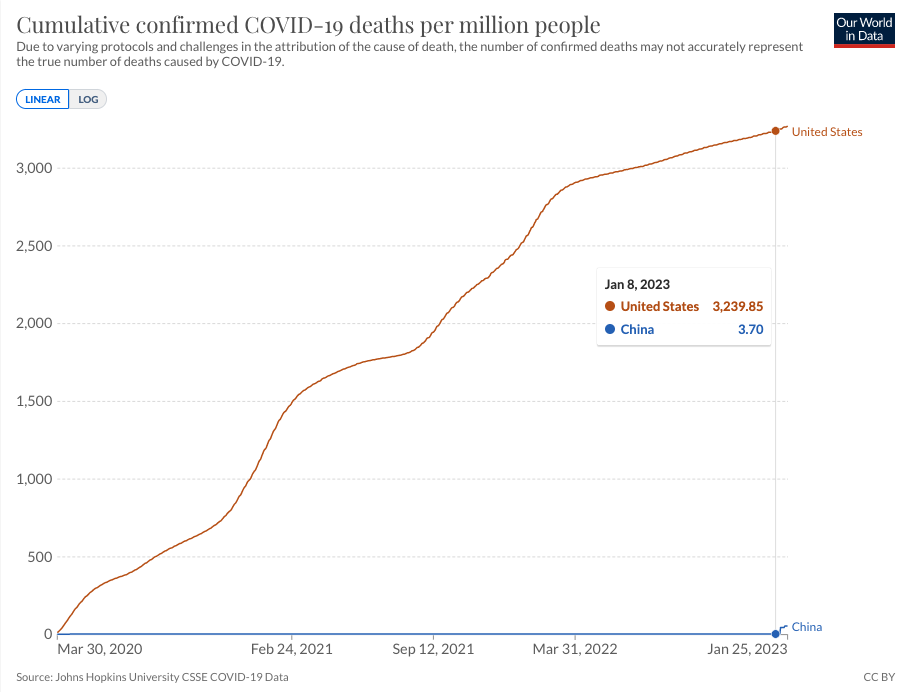
To give you an idea, if we applied the same mortality rate of the United States to China, the number of deaths in China due to COVID-19 would be 4,568,188 instead of the reported 5,273 by Jan 8, 2023.
The United States has a first-class health care system compared to China. So why is there such a significant discrepancy in the mortality data? Is this a matter of overreporting in the United States or underreporting in China, or is there something else going on?
Let’s look at other countries besides the United States.
Japan and South Korea, being two of Asia’s most affluent and industrialized nations, have significant economic and trade ties with China. Similarly, Singapore, a city-state known for its stringent social policies, maintains a strong relationship with the Chinese market.
All three countries have been widely successful in their COVID-19 containment programs, with mortality rates 10 to 20 times lower than in Europe or North America.
Surprisingly, China claims to have a COVID-19 mortality rate that is 82–170 times lower than those in Japan, South Korea, and Singapore.
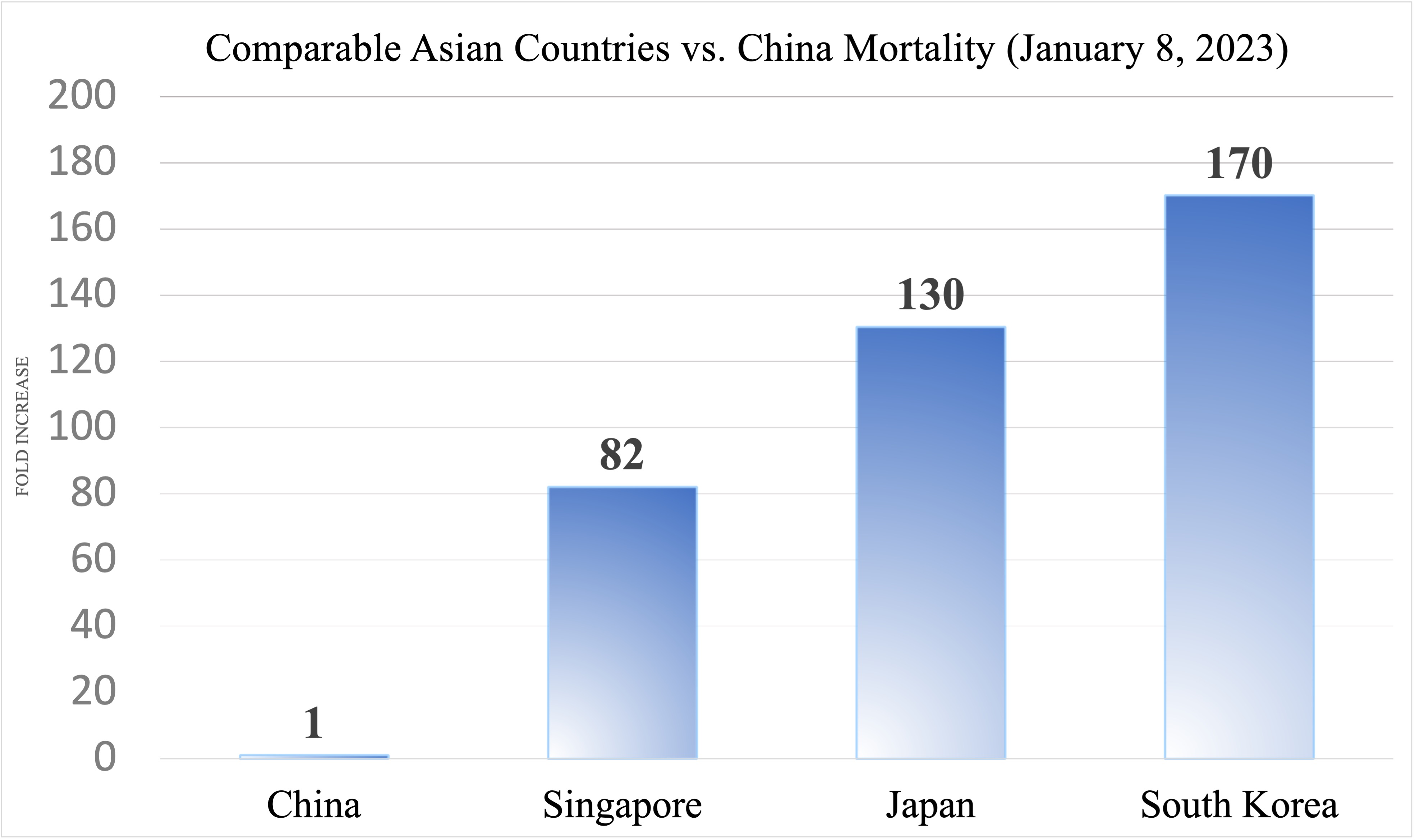
Even more surprisingly, compared to its neighbors, such as Mongolia, Vietnam, Kyrgyzstan, Laos, and India, China claims a mortality rate of 27–170 times lower than these Asian nations.
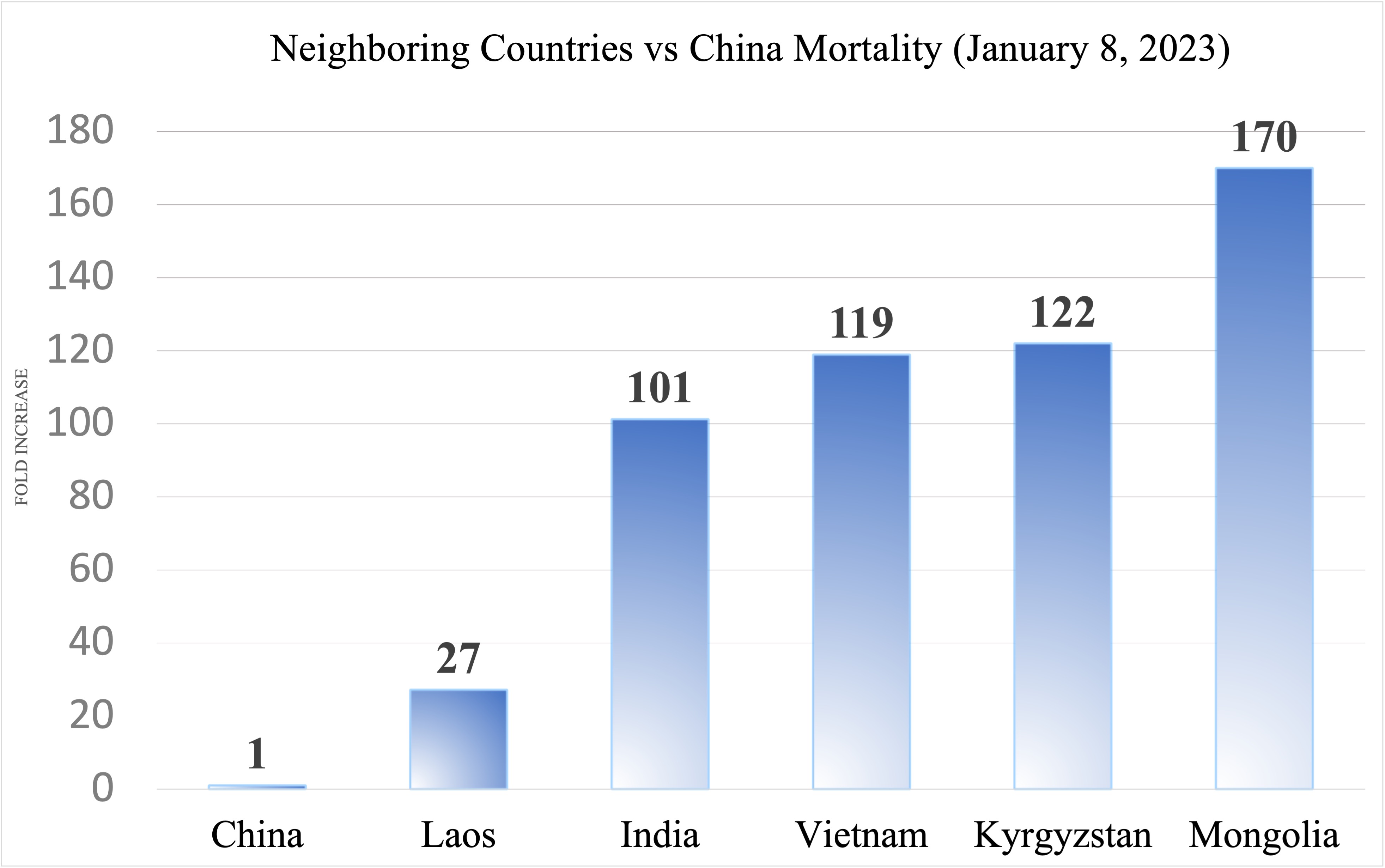
If that’s still not enough, let’s compare three countries that strongly contrast China’s officially claimed numbers.
One of these countries is Taiwan, known for its highly effective containment efforts. The proximity and genetic similarities between the two nations make this comparison particularly relevant.
Yet what was the mortality difference between these countries? According to Our World in Data, Taiwan has a mortality rate of 650 per million people, yet China claims to have a bewildering mortality rate about 175.6 times lower than Taiwan’s.
On a similar note, South Korea has an impressively low mortality rate of about 630 deaths per million. The country is quite comparable to China in many respects, yet China’s reported death rate is about 170 times lower than South Korea’s.
While it is true that each country’s response to the COVID-19 pandemic has been unique, some countries exercised similar practices. For example, the New Zealand government adopted a “zero-COVID” strategy, similar to the approach taken by China, to control the spread of the virus early on. Given the similarities in their respective policies, one would expect similar mortality rates and overall effectiveness in these countries.
Yet was that the case? If we look at China’s mortality rate, it is about 125 times lower than New Zealand’s, which reported about 462 deaths per million!
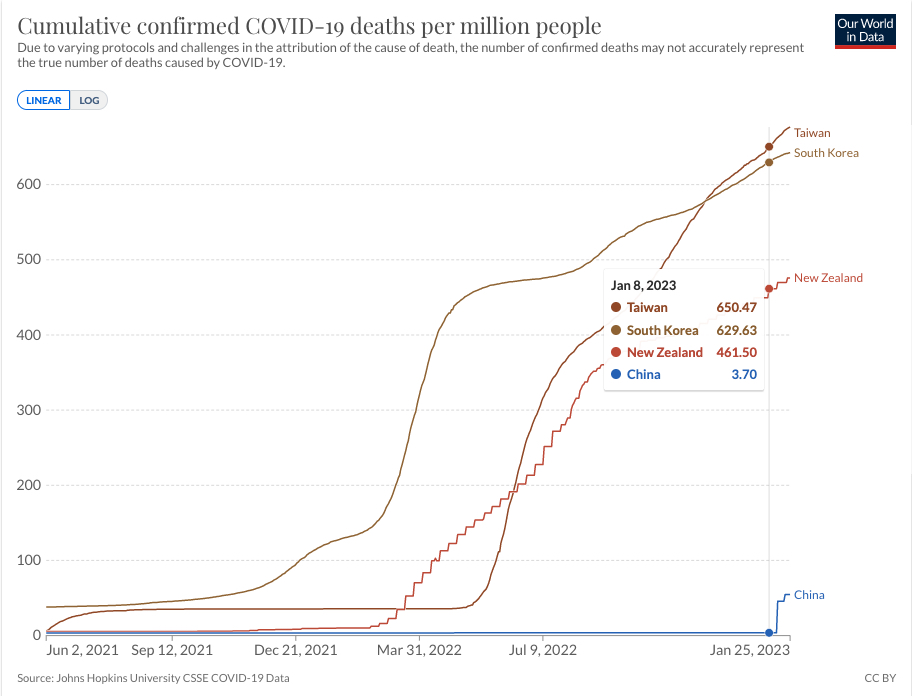
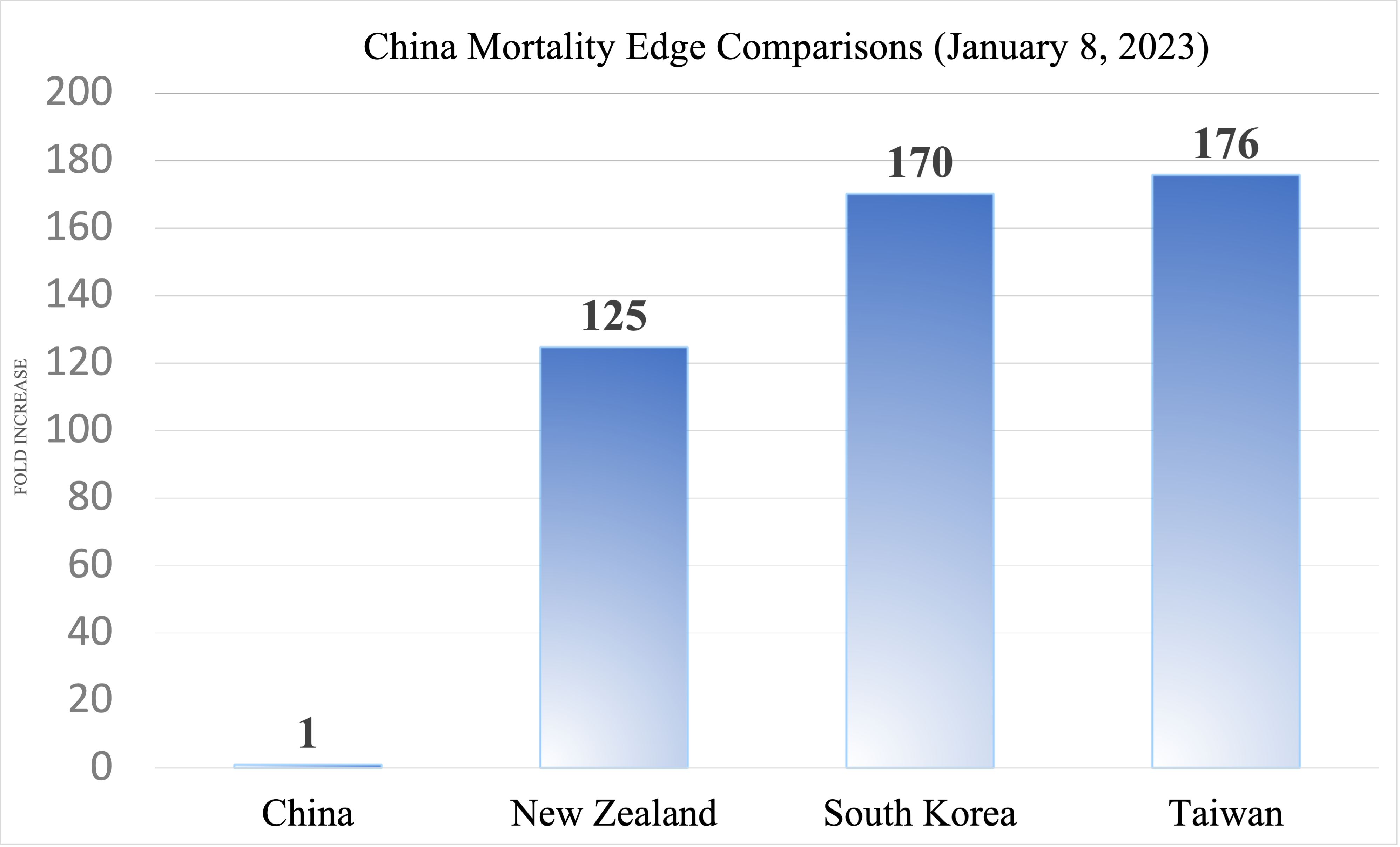
It is not unexpected that the mortality rate figures reported by China have been met with skepticism. However, what is notable is the CCP’s apparent disregard for transparency and honesty in its handling of this issue. Its efforts to deceive the international community are a cause for concern.
Underreported Mortality in China–Excess Death
Excess mortality, also known as excess death, is a metric that measures deaths above and beyond what would be expected under normal conditions. This metric can spike during specific crises, such as earthquakes and hurricanes, but it also proves to be a valuable tool for observing the impact of COVID-19 on mortality.
By taking into account confirmed deaths, deaths that were not correctly diagnosed and reported, and deaths from other causes, excess mortality provides a more comprehensive estimate of the total impact of the pandemic.
Calculating excess death is simple: excess deaths = reported deaths – expected deaths
For example, during the early weeks of the pandemic in the United States, an estimated 15,400 excess deaths were recorded. Of these excess deaths, 8,128 were COVID-19-attributed, while the remaining 7,272 were non-COVID-related deaths, according to an analysis of federal data conducted for The Washington Post by a research team led by the Yale School of Public Health.
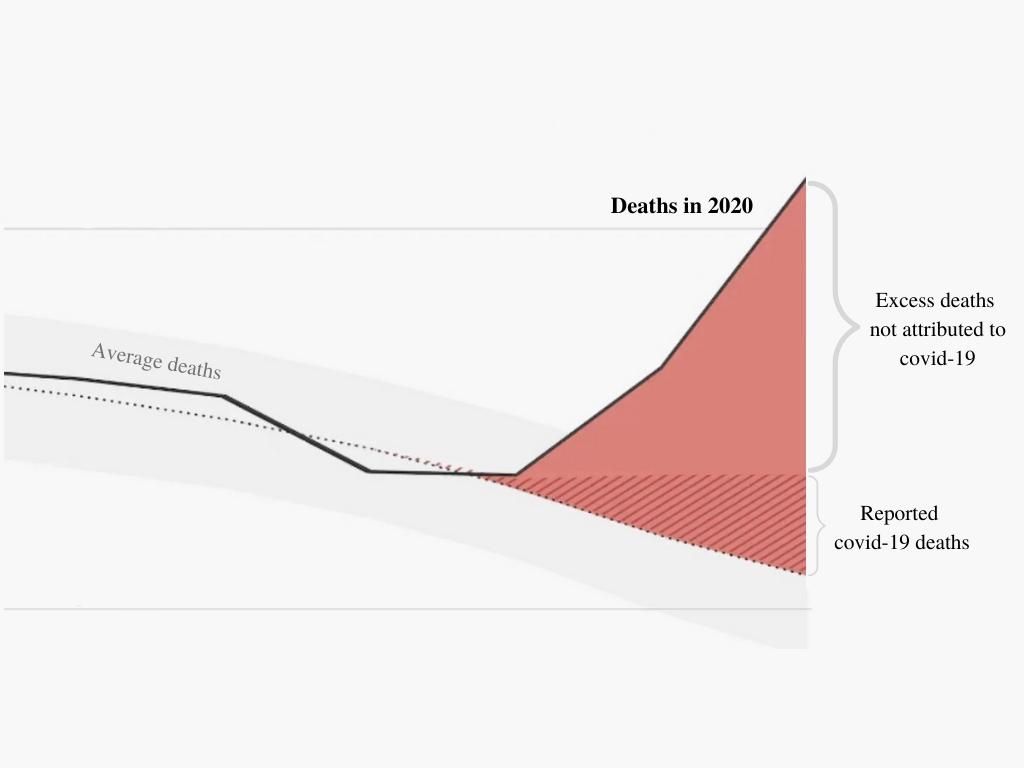
Worldwide, it’s estimated that the actual number of deaths caused by COVID-19 was about 18 million by the end of 2021, three times more than the roughly 6 million deaths reported, according to an article published in The Lancet. This suggests that the full consequence of the pandemic is much greater than what has been indicated by the official data.
In another analysis by The Economist, excess mortality was estimated to be 28.1 million at the end of 2022 (at a 95 percent confidence interval), which is 4.2 times greater than the officially reported numbers.
In Asia, the official number of deaths was about 322 per million people. However, according to The Economist, on Jan. 8, the estimated excess deaths were 150–390 per 100,000 people. That’s +1,000 percent, i.e. 10-fold from the official records reported in Asia.

Even more striking, Our World Data shows that China reported 0.37 deaths per 100,000 people, and up to 0.6 per 100,000 according to China’s spokesperson of Foreign Administration. Yet on Jan. 8, according to The Economist, the estimated excess deaths were 0.83–180 per 100,000, leading to an increase of +14,000 percent, i.e., 140-fold. Contrast this to other countries where the estimated death is no more than a 10-fold range.

On the global stage, China stands out as a unique case, with statistics that suggest a level of dishonesty that is unprecedented. As mentioned above, China’s excess mortality rate is estimated to be an astounding +14,000 percent, i.e., 140-fold, compared to other nations. This figure is truly staggering and defies explanation.
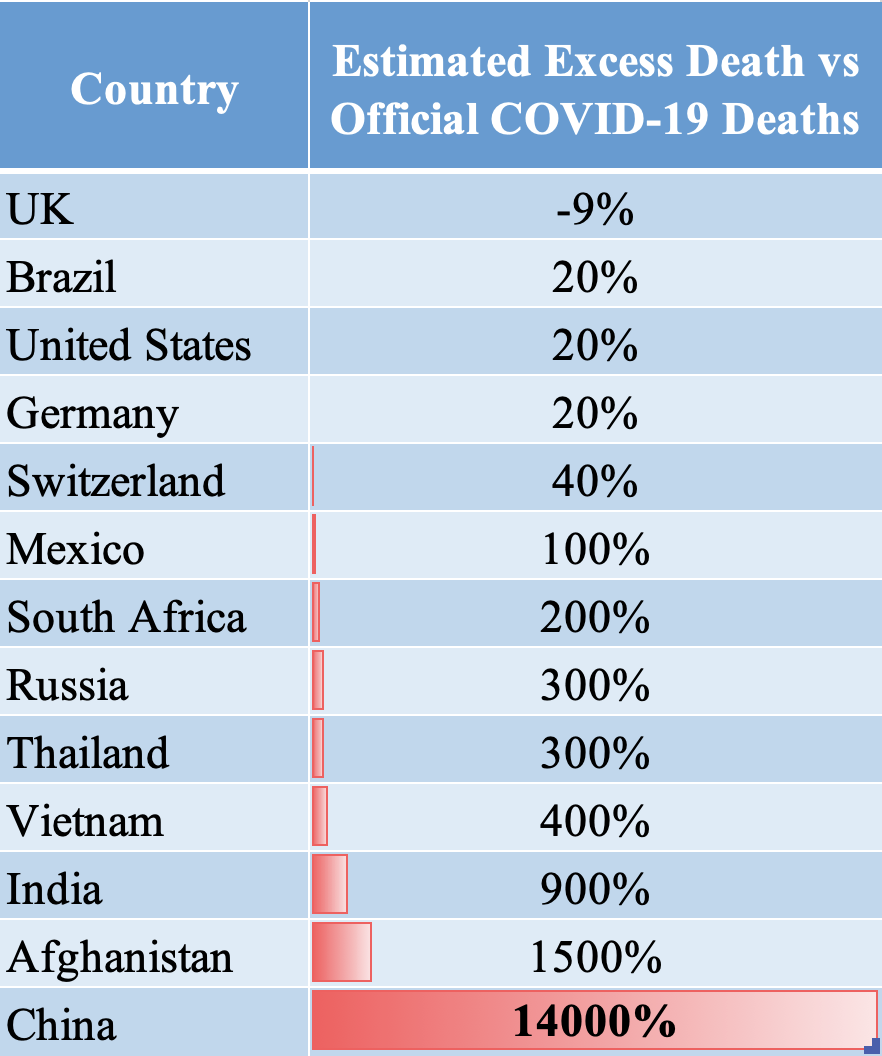
It is worth noting that the Chinese Center for Disease Control and Prevention (CDC) reported close to 60,000 deaths without a clear explanation from Dec. 8, 2022, to Jan. 12, 2023. However, the Chinese regime continues to insist there have been only roughly 5,273 deaths up until Jan. 8, 2023.
Lack of transparency on these sudden almost 60,000 deaths makes this figure highly questionable, and not acceptable by international standards. Therefore, we have excluded this figure and used China’s long-held number of 5,273 deaths on Jan. 8, 2023, to conduct our analysis.
Pneumonia Cases Not Attributed to COVID-19
In February 2021, the British Medical Journal published a report on nationwide mortality during the first three months (Jan. 1 to March 31, 2020) after the outbreak in Wuhan. The study aimed to assess the excess cause and cause-specific mortality in Wuhan city and other parts of China.
The analysis included more than 300 million people and represented more than 605 urban districts and rural counties in China. The Disease Surveillance Point (DSP) system recorded 580,819 deaths in those three months. The researchers concluded that there were 5,954 more deaths in Wuhan compared to the same period in 2019 due to an eightfold increase in pneumonia deaths, “mainly COVID-19 related.” This calculation suggests that the actual COVID-19 death count for that period was at least 56 percent higher than the official figure.
In May 2021, The Economist reanalyzed the same data in the supplementary table provided by the BMJ researchers. By reestimating the excess mortality, they found that the total excess death in Wuhan between Jan. 1, 2020, and March 31, 2020, numbered 13,400 deaths. That is more than triple the official count and more than double the estimate in the BMJ paper.
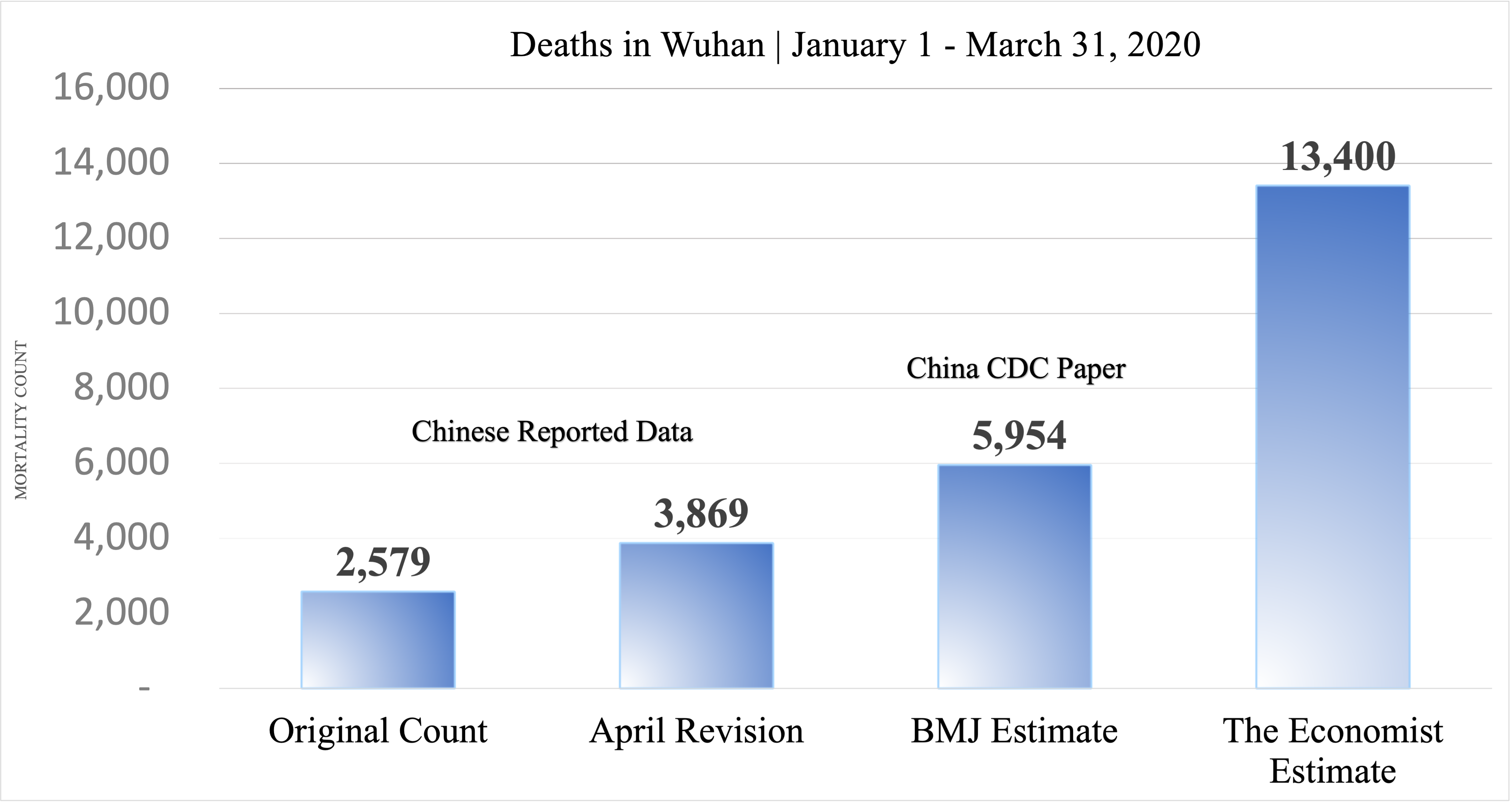
Wuhan’s pneumonia mortality data in this period is highly significant because it is direct evidence that the Chinese CDC knew that the excess death in China was much higher than the reported numbers. It also implies that other COVID-19 deaths in China may have been underreported or incorrectly attributed to other causes. Yet the CCP still intentionally lied to the world in official channels and claimed that there were only 5,273 deaths as of Jan. 8, 2023.
Part 2 of this series will analyze multiple factors that hint at the number of deaths in China while ultimately providing an estimate of the amount.
Views expressed in this article are the opinions of the author and do not necessarily reflect the views of The Epoch Times. Epoch Health welcomes professional discussion and friendly debate. To submit an opinion piece, please follow these guidelines and submit through our form here.












